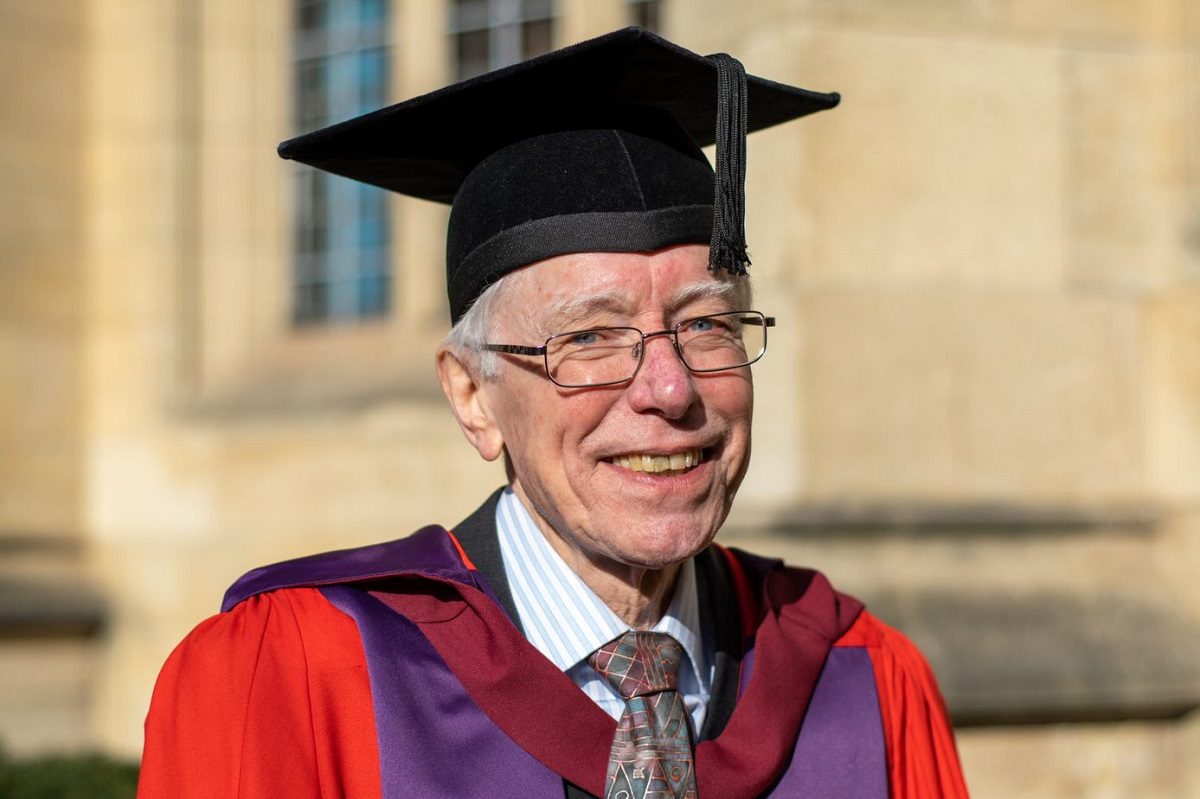
Nick Axten graduated from his PhD program at the University of Bristol in February, over 50 years after he began his doctorate.
11:46 JST, February 27, 2023
When Nick Axten restarted his doctorate in philosophy after a four-decade hiatus, he loved taking the hour-long bus ride to the University of Bristol campus each day. While he sat with his thoughts, others sat on their phones. He said the ride was a uniquely productive time to flirt with solutions to his work in his head.
Academia used to think bigger, said Axten, 76, and universities were more concerned with their students learning something new, rather than simply finding their next job.
“It’s gotten rather serious being a student recently, and I don’t know why,” Axten told The Washington Post. “Everyone used to have more of a laugh.”

Nick Axten in his early 20s.
Axten started his studies in 1970, left the program in 1975 and worked various jobs before returning to school. He finally completed his doctorate in philosophy this month.
In the intervening years, the world and academia had changed. Institutions today have lost sight of how to actually improve people’s lives, beyond incremental changes, Axten said. He hopes his persistence will inspire others to buck the trend in academia, and other career fields, of rushing through work and simply following a well-traveled path.
“People just don’t have enough time to think these days,” Axten said. “But often the world needs to do just that.”
With long, wavy hair and thick-rimmed glasses, Axten began his research while on a Fulbright Scholarship at the University of Pittsburgh, an ocean away from his hometown of London. He wanted to understand people’s values, and how those values change over time.
Axten had come from a university in Leeds in northern England where students were rebellious, relaxed and laser focused on music. He often went to concerts and thought big thoughts on life. But he had difficulty adjusting to academia and realized he wouldn’t have enough time to produce the wide-ranging research he felt was merited. He and his wife divorced, and Axten returned to home without a dissertation, hoping to find a way to continue his work.
But England in the 1970s was a difficult place to be an upstart academic. There were few job openings, so he formally left his research – though he never stopped tinkering with it in his mind – and developed an educational program to teach science to elementary school students. He remarried in 1988 and took on his wife’s children, and later grandchildren, as his own. He worked as a painter, a carpenter, a photographer, a picture framer and whatever other odd jobs he could find. He settled into a position as a premises manager for a school.
“My theory in life is if people ask me to do something, say ‘yes,’ then do my best,” he said when explaining his winding career path.
While he was getting on with his life, Axten figured someone else would eventually pursue the research he had started. But no one did. Over the years, he’d think nearly every day about the work he began in Pittsburgh.
Finally, in 2015, he retired and had time to pen a 70,000-word text fleshing out his ideas. By now, the wavy hair was shorter and grayer, and he realized he needed an academic setting to nurture those ideas.
While he enjoyed being back in the classroom with PhD candidates who were a third of his age – and he loved going to the pub with them – he found the world of academia had changed. It was more industrialized, more cutthroat, more focused on publishing papers than finding new theories.
Through his lifetime of odd jobs, Axten had developed a deeper understanding of human behavior. He had seen people at their best and worst, at their most creative and most sterile. He hoped to use his breadth of experience, something no other peer would have, to do what he felt science could do best:generate a radically new concept to improve people’s lives.
Working with a professor born a year after he began his PhD, Axten developed a new theory for “understanding human behavior based on the values each person holds.”
Axten’s doctoral thesis, titled “The problem of hyperbolic discounting,” may be difficult to decipher for the layman. But it’s intended to challenge the typical models of behavioral economic thinking to find out how “rational” people make decisions.
Axten’s thesis explains that people’s decisions are based on criteria that include the number of choices available, the likelihood any one choice will pay off and how far into the future that payoff might be. Axten hopes the research can be used to better predict how people will act in a range of typical situations.
Samir Okasha, Axten’s doctoral supervisor, told The Post that the research looked at how people choose between outcomes that will occur at different points in the future. “Broadly, the subject matter of the dissertation was at the intersection of two sub-fields of philosophy: rational choice theory and the philosophy of psychology,” Okasha said.
Axten said he had been thinking through the topic for the vast majority of his life. “It turned out that was more difficult than I expected,” he said. “I just needed a long, hard think.”
He hopes his research will be published and help others get a better grip on how variable their futures can be, but also how much they can do to affect what comes next in their lives.
At his graduation, Axten’s granddaughter stood with him and his wife as he wore his red and purple gown over a black suit. He was proud he’d spent his lifetime dedicated to this problem, and never thought he’d receive his degree while a granddaughter was there to celebrate with him.
“I’m 76, it’s a ridiculous age to be doing this. Think about the lesson that that leaves her with,” he said. “Keep at something, even if it takes you your whole life – it’ll pay off in the end.”
Top Articles in News Services
-

Survey Shows False Election Info Perceived as True
-

Hong Kong Ex-Publisher Jimmy Lai’s Sentence Raises International Outcry as China Defends It
-

Japan’s Nikkei Stock Average Touches 58,000 as Yen, Jgbs Rally on Election Fallout (UPDATE 1)
-

Japan’s Nikkei Stock Average Falls as US-Iran Tensions Unsettle Investors (UPDATE 1)
-

Trump Names Former Federal Reserve Governor Warsh as the Next Fed Chair, Replacing Powell
JN ACCESS RANKING
-

Producer Behind Pop Group XG Arrested for Cocaine Possession
-

Japan PM Takaichi’s Cabinet Resigns en Masse
-

Japan Institute to Use Domestic Commercial Optical Lattice Clock to Set Japan Standard Time
-

Man Infected with Measles Reportedly Dined at Restaurant in Tokyo Station
-

Israeli Ambassador to Japan Speaks about Japan’s Role in the Reconstruction of Gaza
























